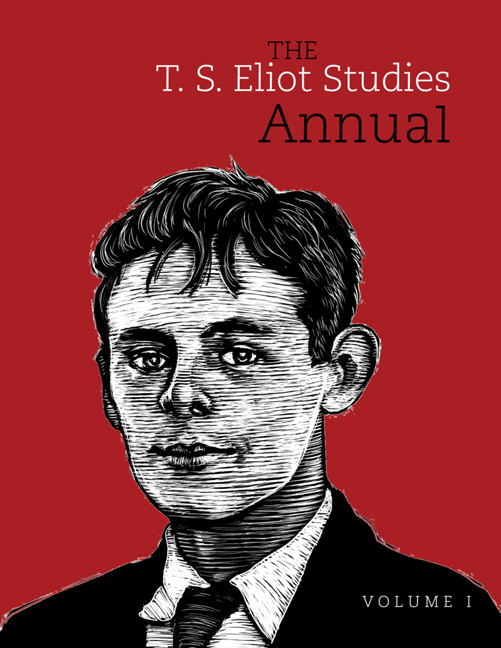Book contents
- Frontmatter
- Contents
- Abbreviations of Works
- General Editor's Note
- The Short and Surprisingly Private Life of King Bolo: Eliot's Bawdy Poems and Their Audiences
- Dull Tom-Tom's Absurd Prelude: Ludic Modernism in Early T. S. Eliot
- Eliot at Bergson's Lectures, 1910–1911
- The American Legacy of “Prufrock”
- Poetry (June 1915)
- The Stale Dregs of Revolt
- Prufrock, Belated
- Eliot's Allusive Legacy and Obscurity in “Prufrock”
- Transmuting F. H. Bradley: T. S. Eliot's Notes Towards a Theory of Poetry
- T. S. Eliot, Phenomenologist
- Astride the Dark Horse: T. S. Eliot and the Lloyds Bank Intelligence Department
- Aristophanic Structures in Sweeney Agonistes, “The Hollow Men,” and Murder in the Cathedral
- Eliot and Virgil in Love and War
- T. S. Eliot Bibliography 2014
- Notes on Contributors
The American Legacy of “Prufrock”
- Frontmatter
- Contents
- Abbreviations of Works
- General Editor's Note
- The Short and Surprisingly Private Life of King Bolo: Eliot's Bawdy Poems and Their Audiences
- Dull Tom-Tom's Absurd Prelude: Ludic Modernism in Early T. S. Eliot
- Eliot at Bergson's Lectures, 1910–1911
- The American Legacy of “Prufrock”
- Poetry (June 1915)
- The Stale Dregs of Revolt
- Prufrock, Belated
- Eliot's Allusive Legacy and Obscurity in “Prufrock”
- Transmuting F. H. Bradley: T. S. Eliot's Notes Towards a Theory of Poetry
- T. S. Eliot, Phenomenologist
- Astride the Dark Horse: T. S. Eliot and the Lloyds Bank Intelligence Department
- Aristophanic Structures in Sweeney Agonistes, “The Hollow Men,” and Murder in the Cathedral
- Eliot and Virgil in Love and War
- T. S. Eliot Bibliography 2014
- Notes on Contributors
Summary
The Americanness of “Prufrock,” which we now tend to overlook, shaped the poem's reception as revolutionary and helps to explain Eliot's departure from the poetic conventions that were familiar to his readers. “Prufrock” was first published in the June 1915 issue of the Chicago-based Poetry, which had awarded prizes to Vachel Lindsay, Edgar Lee Masters, and Robert Frost, and in Pound's Catholic Anthology (1915), which was reviewed by Edgar Jepson in a May 1918 issue of The English Review. Jepson emphasized the American origins of Eliot's poem: “Western-born of Eastern stock, Mr. T. S. Eliot is United States of the United States; and his poetry is securely rooted in its native soil; it has a new poetic diction…. It is new in form, as all genuine poetry is new in form; it is musical with a new music, and that without any straining after newness…. Never has the shrinking of the modern spirit from life been expressed so exquisitely and with such truth.”
The new musical form praised by Jepson underscores Eliot's adaptation of jazz-inflected popular song in “Prufrock,” resulting in a revolutionary new style more lasting and innovative than what Jepson called the “jingling verse” of Vachel Lindsay. David Chinitz has shown how Eliot's vers libre and use of song rhythms in “Prufrock” were, as Eliot acknowledged, indebted to Laforgue, who taught him to “adapt his voice to the popular material around him,” and this influence was complemented by the “nearly suppressed yet indispensable influence of American jazz.”
And what about Edgar Lee Masters? Although Pound's enthusiasm for “Lee Masterism” quickly abated, Eliot, examining Masters's poems, may have been struck by uncanny similarities with his own writing. Indeed, in his October 1916 review of Masters's Songs and Satires, Eliot seems to have learned and clarified, through Masters's negative example, something about his own lyric practice, even going so far as to write in the idiom of “Prufrock.” Consider Eliot's opening distinction between “you” and “I,” a device that complicates his soliloquy by raising the question of whether Prufrock is speaking to himself or to someone else, in light of Eliot's remark:
It is clear that Mr. Masters needs to set himself one particular problem in order to bring his gifts into focus.
- Type
- Chapter
- Information
- The T. S. Eliot Studies Annual , pp. 67 - 72Publisher: Liverpool University PressPrint publication year: 2017



